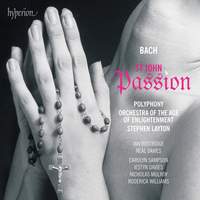Recording of the Week,
JS Bach: St John Passion from Polyphony and Layton
I seem to spend a lot of time in these newsletters enthusing about new discoveries, revived rarities or fresh perspectives on well-known repertoire but today I’m going to evangelise (pun intended) about a very straightforward recording of a very familiar work. This new St John Passion from the Orchestra of the Age of Enlightenment and Polyphony doesn’t use a new or unfamiliar version of the score; it’s not taken from a staged performance (though the spitfire drama of the crowd-scenes sounds as if it might have been), and it doesn’t employ unusually large or small forces: it’s remarkable simply because it’s practically perfect in every way.

This is essentially a ‘traditional’ period-instrument performance, at standard baroque pitch and with the players of the OAE (on the best form I’ve heard them in years) numbering just over twenty. Notable recent recordings of the Passions have tended to be either super-sized (the Berlin Phil’s staged Matthew, which I reviewed around this time last year) or pared right back, Rifkin-style, with just a couple of singers on each part, often sharing solo duties too.
Polyphony treads a middle ground, with thirty-odd mixed voices (the combination of male and female altos works beautifully, right from their pungent first entry in the hair-raising opening chorus) and the perfect mixture of character and blend: many of the (predominantly quite young) singers here already have fledgling solo careers underway and several have pretty sizeable voices, but there’s no grandstanding or intrusive vibrato anywhere and the smaller solo roles are all taken with panache. Where you can hear each individual voice, however, is in the baying crowd-scenes: every single singer seems to have a character here, and the cumulative effect, especially at Layton’s aptly frenetic tempi, is really quite terrifying. (Try ‘Lasset uns den nicht zerteilen’ – as the avaricious bystanders cast lots for Christ's cloak – with its percussive, vicious sibilants and see if you don’t agree!).
The gifts for story-telling and word-painting which have won Ian Bostridge such acclaim in German song also make him a superb Evangelist: no dispassionate observer, this volatile St John is capable of switching from righteous anger to barely-controlled grief in an instant and though he’s been singing the Passions for over a decade he still sounds as if he’s telling this familiar story for the first time. (Though the booklet doesn’t acknowledge it, he also takes the short aria ‘Ach, mein Sinn’ – usually allotted to the tenor soloist - with blistering vehemence).
The soloists, too, are all perfectly cast. Carolyn Sampson has to be one of the finest Bach sopranos around, with a clean, straight tone that has enough warmth and colour not to sound like an imitation-treble; Roderick Williams is grimly dramatic when summoning the hordes to Golgotha in ‘Eilt, eilt!’ and all tender humility in ‘Mein teurer Heiland’, whilst Nicholas Mulroy contrasts nicely with Bostridge and offers a spellbinding ‘Erwege’. But it’s Iestyn Davies who really takes the laurels. With never a hint of hootiness, absolutely no break between registers and seemingly limitless reserves of breath, his first aria (‘Von den Stricken’) is a marvel of control and line, and ‘Es ist vollbracht’ is just as good: the interplay between Davies and Richard Tunnicliffe’s weightless gamba obbligato is magical, and the triumphant allegro is one of the most vivid and exciting I’ve ever heard.
I often receive emails asking for recommendations of particular works, and the Passions tend to crop up rather a lot because there’s such a range of different approaches on offer: when it comes to the St John, ladies and gentlemen, I think we have a new winner.
Ian Bostridge (Evangelist), Carolyn Sampson (soprano), Nicholas Mulroy (tenor), Neal Davies (bass), Iestyn Davies (countertenor) & Roderick Williams (baritone), Orchestra of the Age of Enlightenment & Polyphony, Stephen Layton
Available Formats: 2 CDs, MP3, FLAC, Hi-Res FLAC



